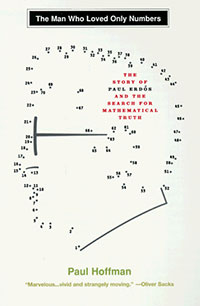

It also contains some history of Europe and the United States of Erdős's time. Hoffman also tries to give examples of what mathematics is and why he views it as important, and why many mathematicians such as Erdős devote their whole lives to mathematics.

In the book, Erdős enjoys listening to Hardy when he speaks about Ramanujan. Content Ī large part of the book concerns Erdős, but a lot of it is about other mathematicians, past and present, including Ronald Graham, Carl Friedrich Gauss, Srinivasa Ramanujan, and G.H. After this, Hoffman followed Erdős on his travels for the last 10 years of his life learning about his exceedingly unusual life and interviewing his numerous collaborators in the process of writing this book. Hoffman received an assignment by The Atlantic Monthly in 1987 to profile Erdős, which won the National Magazine Award for feature writing. The book won the 1999 Rhône-Poulenc Prize, beating many distinguished and established writers, including E. The book was a bestseller in the United Kingdom and has been published in 15 different languages. The book is, in the words of the author, "a work in oral history based on the recollections of Erdős, his collaborators and their spouses". The book was first published on July 15, 1998, by Hyperion Books as a hardcover edition. The Man Who Loved Only Numbers is a biography of the famous mathematician Paul Erdős written by Paul Hoffman. To restore Folkman's confidence, Erdős immediately challenged him to solve mathematical problems. The Man Who Loved Only Numbers describes how Paul Erdős visited Jon Folkman after Folkman awoke from surgery for brain cancer.


 0 kommentar(er)
0 kommentar(er)
